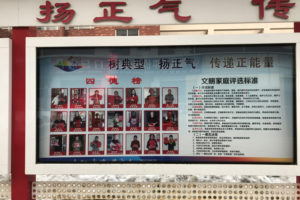In the future, people will be controlled by data accumulated by the ruling class.
Citizens will be assigned a social credit number at the age of maturity—or perhaps even at birth. Every purchase, business transaction, and social media post will be tracked and valued according to government notions of virtue.
Actions like taking care of an elderly parent, speaking well of an official or a law, and volunteering at an approved charity, will raise an individual credit score. Unworthy actions and attitudes will lower it. The higher the score, the greater the privilege: discounts on utilities, preferential treatment for housing or school, even a wider pool of potential marriage partners. The lower the score—well, go low enough and you may not even be able to buy an airline ticket.
Does that sound scary to you? Then this will sound even scarier: in China, the future is two years away.
2020 is the target year for instituting a nation-wide social credit system. In one sense, it’s a dream come true: throughout human history, unruly citizens have been controlled by threats. It’s not very efficient and it breeds resentment. But if a nation’s citizens could be controlled by rewards, they would voluntarily act in the public interest, whatever the government determines the public interest to be.
The program has been test-running in selected Chinese cities. In Rongcheng, a city on the northeastern coast with a population of almost 700k, residents have willingly embraced it. Pictures of so-called “civic heroes” are displayed on electronic bulletin boards. Citizens have even taken it on themselves to police each other, debiting their neighbors for “illegally spreading religion,” for instance. Writing in the online magazine Wired last October, Rachel Botsman compared China’s social credit system to a vast rewards program or video game: “It’s gamified obedience.”

I can see how this might work there; China is traditionally a much more ordered society than ours. But how far-fetched is the possibility of a similar program here? Private entities like Amazon, Google and Facebook already have vast amounts of data on everyone who makes a purchase, enters a search term, or posts a picture. They’ve used the information to sell targeted advertising, and in the process have become fabulously rich and powerful. They’ve also come under fire for abusing that power. Facebook founder Mark Zuckerberg, testifying before Congress last April, said he would welcome government regulation of Facebook to curb exploitation of data. Whether he realizes it or not, what he’s proposing is the marriage of big tech to big government, and the vastly-expanded capacity for exploitation.
Throughout history power has been the rule, freedom the exception. The freedom promised by the “information highway” thirty years ago turns out to have a cost when that very information can be used to manipulate us. The biblical call to “renew your minds” takes on a new urgency for Christians: to know what we believe, and why. Hold fast to the truth, and it will keep us free.

